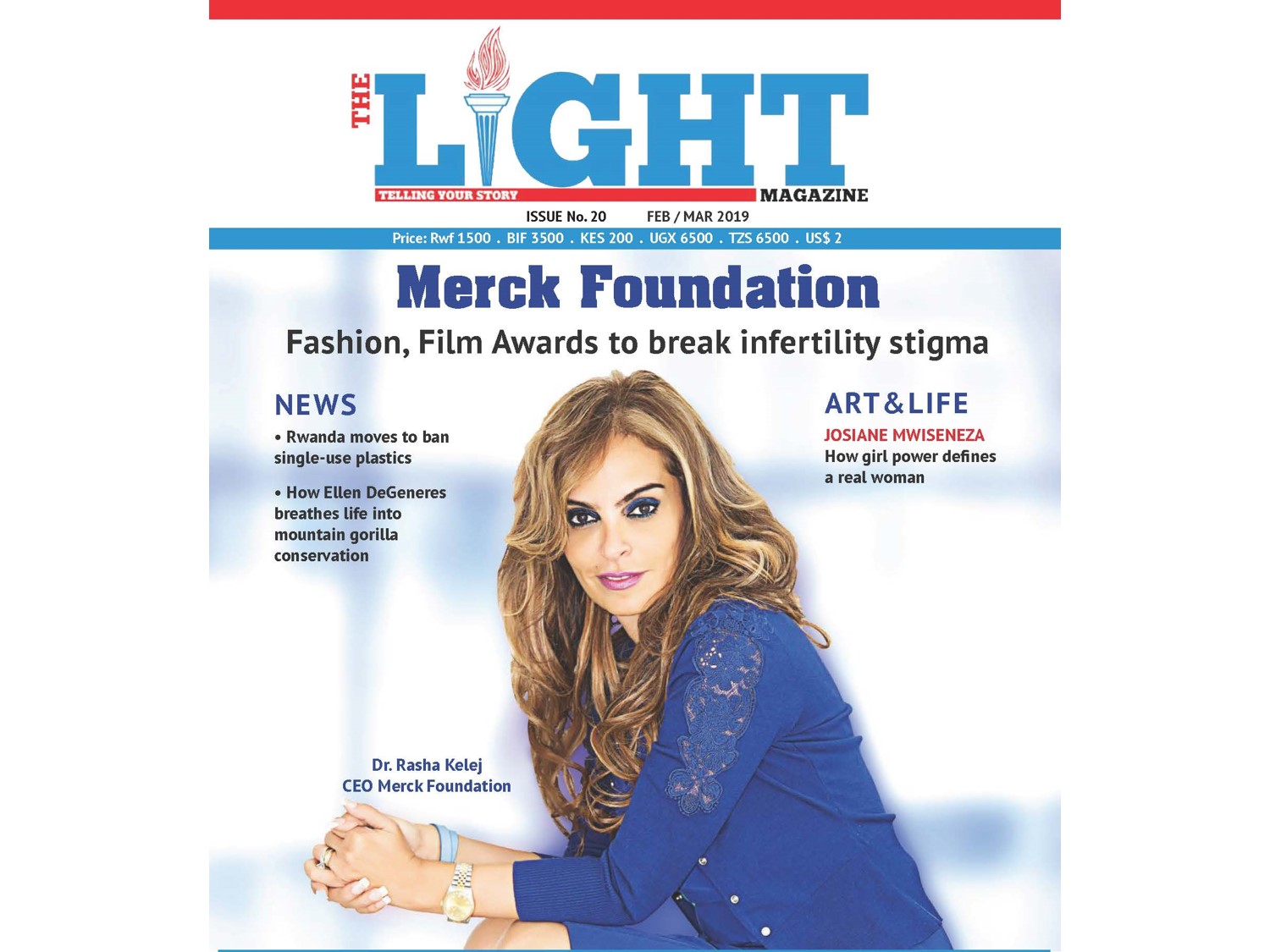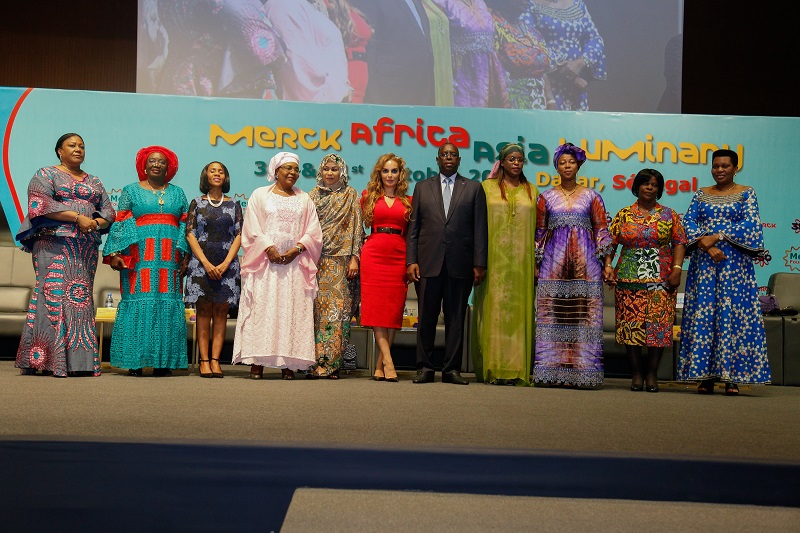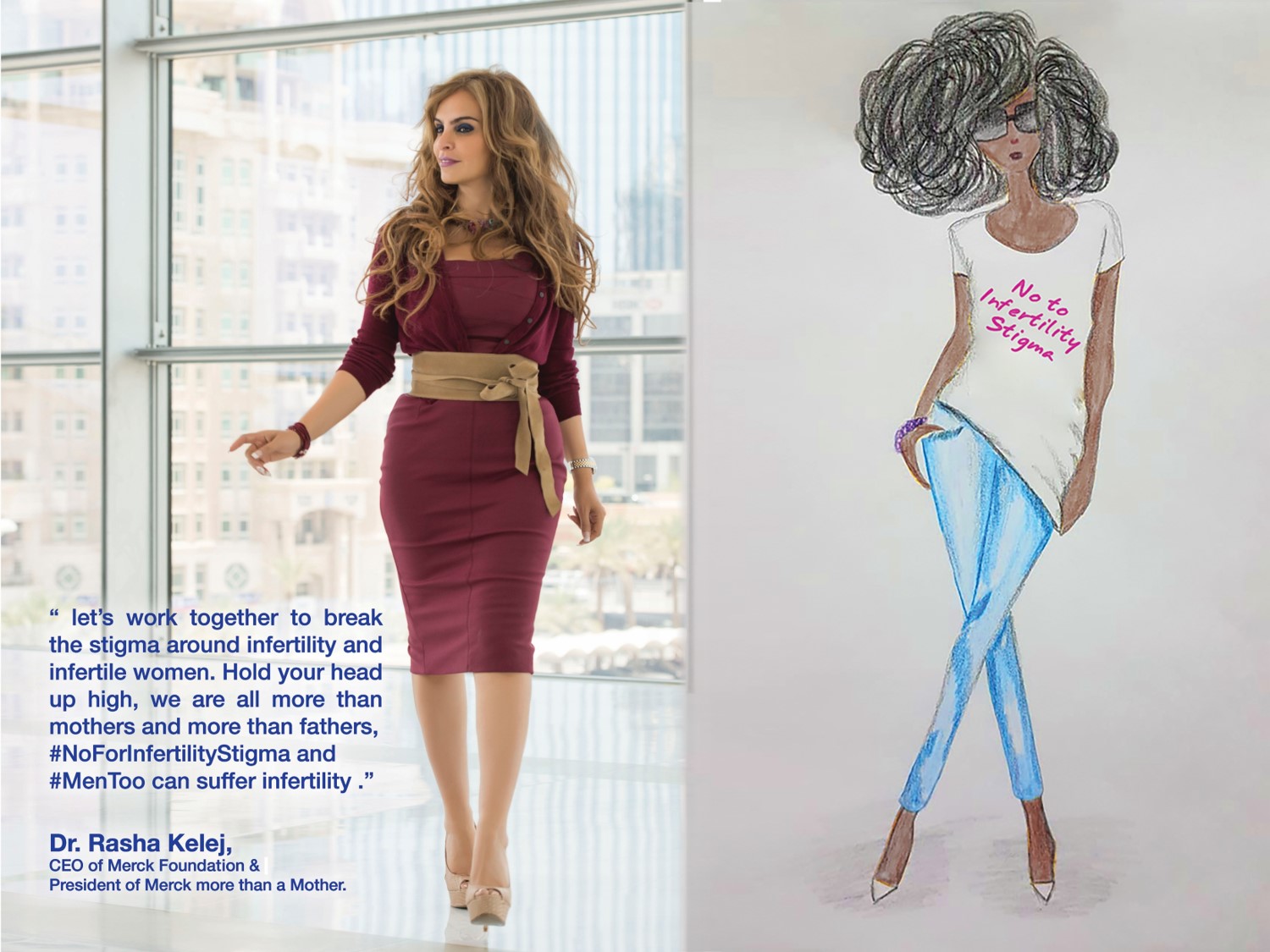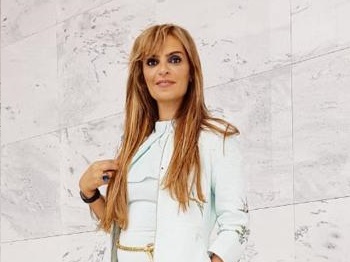
Merck Foundation, a philanthropic organization that aims to improve the health and wellbeing of people and advance their lives through science and
technology, has launched Merck more than a Mother Fashion and Film Awards aimed to empower infertile women, and break stigma around infertile women in Africa. In an exclusive interview on a wide range of issues, with The Light Magazine, Merck Foundation CEO Dr. Rasha Kelej said the awards which have been launched in Ghana and Zambia would be scaled up to other African countries starting with Rwanda and Nigeria. Below are the excerpts.
Q. We have heard about you in all over Africa and some people call you Mama Africa, share with the readers about yourself, your journey towards becoming the CEO of Merck Foundation, what is the secret behind this name?
I was born in Egypt, simple girl who wanted one day to change the world and be successful; I spent most of my life in United Arab Emirates, between Dubai and Abu Dhabi. I am a Pharmacist by education and have MBA in CSR integration with Business strategy.
I have been working with Merck since 1996; and I am very happy that I broke the glass ceiling after 17 years and now I am the CEO of Merck Foundation, one of the most important foundations in the world. I had this dream but I did not know that I will realize it and will have this promising career by being myself and doing what I love to do. I achieved this dream beca e someday somewhere someone has empowered me and today is my turn to support other women to reach their potential. But not only I like to support women and girls, but also youth in general, may be this is why they call me Mama Africa, a name I really like very much, because it represents the way I care about people reaching their potential, sometimes tough but only because I care very much.
Q. Many young girls look up to inspirational women like you. What advice would you give an 18-year old self?
Believe in yourself and work hard; never allow anyone to let you down, put your heart, mind and soul in everything you do, this is the success factor. And when you make it, do not forget to support other women, remember it will be your turn.
 H.E. REBECCA NAA OKAIKOR AKUFO-ADDO, The First Lady of Ghana; H.E. BRIGITTE TOUADERA, The First Lady of Central Africa Republic; H.E. NEO JANE MASISI, The First Lady of Botswana; H.E. AISSATA ISSOUFOU MAHAMADOU, The First Lady of Niger; H.E. HINDA DEBY ITNO, The First Lady of Chad; Dr. Rasha Kelej, CEO of Merck Foundation; H.E. MACKY SALL, The President of Senegal; H.E. MARIEME FAYE SALL, The First Lady of Senegal; H.E. FATIMA MAADA BIO, The First Lady of Sierra Leone; H.E. ESTHER LUNGU, The First Lady of Zambia; H.E. DENISE NKURUNZIZA, The First Lady of the Republic of Burundi
H.E. REBECCA NAA OKAIKOR AKUFO-ADDO, The First Lady of Ghana; H.E. BRIGITTE TOUADERA, The First Lady of Central Africa Republic; H.E. NEO JANE MASISI, The First Lady of Botswana; H.E. AISSATA ISSOUFOU MAHAMADOU, The First Lady of Niger; H.E. HINDA DEBY ITNO, The First Lady of Chad; Dr. Rasha Kelej, CEO of Merck Foundation; H.E. MACKY SALL, The President of Senegal; H.E. MARIEME FAYE SALL, The First Lady of Senegal; H.E. FATIMA MAADA BIO, The First Lady of Sierra Leone; H.E. ESTHER LUNGU, The First Lady of Zambia; H.E. DENISE NKURUNZIZA, The First Lady of the Republic of Burundi Q. Infertility is a sensitive issue in Africa, however it has been neglected so far, what led you to create your signature campaign “ More than a Mother” to address this sensitive issue.
A- In many cultures in Africa, Infertility is a huge stigma and women are solely blamed for it. According to WHO data 2016, one in every four couples in Africa and developing countries are infertile which means that there are 180 M infertile couples, it is not a small number. A very high percentage of infertility cases is due to untreated infectious diseases which result from child marriage, unsafe abortion, unsafe delivery, STDs and genital mutation. These kinds of infertility cases can be prevented. Hence prevention is very important. More importantly, mostly only women are held responsible for infertility, although 50% of infertility cases are due to male infertility, therefore we need to create a culture shift to respect women as I believe that ‘Infertility is a shared responsibility’.
Hence we launched ‘Merck More Than a Mother’ campaign to empower women through information, health and change of mindset.
Q. Could you please explain more about Merck More Than a Mother campaign.
This campaign is very close to my heart as an African woman and as a pharmacist. I have met infertile women personally in many villages in the heart of Africa, they told me those stories of suffering and abuse, it was critical for me and for Merck Foundation to help them, if we do not do it who will. This historic campaign works at all levels in 35 African and Asian countries. It defines interventions to break the stigma around infertile women and to raise awareness about infertility prevention, management and male infertility.
Q. We have heard that you have launched Merck more than a Mother Fashion Awards and Film Awards to empower infertile women. This is interesting, how did this idea come about? And how would you involve Rwanda in this innovative approach?
I love art and fashion, I strongly believe that art plays a significant role in raising awareness about sensitive topics like infertility, hence can contribute significantly to break the stigma around infertile women in Africa. Giving people access to data most often leaves them feeling overwhelmed and disconnected, not empowered and poised for action. This is where art can make a difference. Moreover, Africa being the hub for all forms of art, it was very important to reach people using their natural settings.This will help people give their best to help reach out to the voiceless. Hence, we decided to launch ‘Merck More Than a Mother” Fashion and Film Awards. As of now, these awards have been introduced in Ghana and Zambia; however, we plan to scale it up to many other African countries starting with Rwanda and Nigeria.
Through these initiatives we wish to remind our communities that women are more than Just Mothers and Men are more than Just Fathers. It takes both a man and a woman to have a child.

Q. We heard that you have produced songs with African artists. Tell us more about this initiative.
Apart from the awards, trainings and advocacy platforms, we have launched songs with famous singers from Rwanda, Kenya, Sierra Leone and Gambia to raise awareness about male infertility and to break the stigma around infertility in Africa such as Rwandan singer and also a doctor, Tom Close, for “Life is bigger” song and Sunita from Gambia for “More than a Mother” song.
Other two projects are in the pipeline, a song in collaboration with five singers from Ghana, this song will be unique and will make a big difference. Second project is Pan African song with six singers from six countries of west and east Africa.
Q- What about the partnership with media, and how will this help the campaign. Can you elaborate?
I strongly believe that media has a critical role to influence our society and create a cultural shift. Like art, it is our soft power. Hence, we introduced ‘Merck More than a Mother’ Media Recognition Awards; to recognize and appreciate professional journalists who have produced accurate, informative and compelling stories about infertility, infertile women or couples.
Also, Merck Health Media Training; a special training session for the journalists of Africa that focuses on the international standards and media ethics for reporting sensitive issues like infertility in Africa. We are planning to launch this training especially for Rwandan media.
Q- I heard your strategy of educating children to respect women from young ages. What are you doing to achieve this?
It’s important to start teaching children respect and nurturing empathy from a very young age. Hence we created a very inspiring cartoon storybook for children. This is story is our way to empower our boys to develop true respect for women and teach them family values of love and respect and few facts about infertility prevention and how it affects both men and women equally. It will be localized and launched in the elementary level schools of many African countries with message from their respective First Lady, as ambassadors of Merck more than a Mother and Special message from me.
Q. You have many First Ladies as Ambassadors of Merck More Than a Mother, this is a great achievement. How did this happen?
We have currently 10 African First Ladies as Ambassadors of ‘Merck More Than a Mother’. And we are going to partner with more First Ladies
in 2019, currently the First Ladies of Botswana, Burundi, Central Africa Republic, Chad, Gambia, Ghana, Guinea Conarky, Sierra Leone, Niger and Zambia are the ambassadors.
I am very proud that many First Ladies have partnered with Merck Foundation and accepted to become Ambassadors of Merck more than a Mother Campaign and the long term partnership with Merck Foundation and have taken the pledge to build healthcare capacity in their countries and to empower infertile women and break the stigma around infertility.
Merck Foundation has also supported the establishment of the first ever Public IVF centers in Rwanda, Ethiopia and Uganda. Merck Foundation has been providing Embryology & Fertility Training to candidates from Africa and Asia to build capacity in the field of fertility. So far, more than 84 candidates from 29 countries, including five from Rwanda have undergone or are undergoing the training.
Merck Foundation is also making history in many African countries where they never had fertility specialists or specialized fertility clinics before our intervention, such as; in Sierra Leone, Liberia, Gambia, Niger, Chad, and Guinea.

Q. Could you please tell millions of our readers about the work you have done in Rwanda?
Merck Foundation in partnership with Rwanda Ministry of Health has provided support to establish the first public IVF Center in the Military Hospital through providing five candidates with Embryology and clinical training on fertility in the past two years and will continue to improve access to quality and equitable fertility care in the country.
Merck Foundation also provided Health Media Training to six Rwandan journalists through training programs held in Kenya and Senegal. Merck Foundation has provided training to four doctors and will continue enrolling doctors from Rwanda in their one year and two-year oncology fellowship program and Master degree program in Tata Memorial Centre, University of Malaya and Cairo University respectively as a contribution to improve cancer care in the country.
Merck Foundation has also provided two Rwandan doctors with one year diabetes and hypertension diploma at South Wales University - UK and will continue to enroll more doctors in the next five years. We are looking forward to scale up our partnership to make bigger impact in a structured and coherent way under the leadership of The First Lady of Rwanda and Ministry of Health when we meet this year to conclude our partnership.
Download the Merck Foundation App now



Join the conversation on our social media platforms below and let your voice be heard
Join Merck Foundation online community to exchange experience and information with other healthcare providers, researchers, students, policy makers and community members in Africa and beyond
www.merck-foundation.com
free registration
About Merck FoundationThe Merck Foundation, established in 2017, is the philanthropic arm of Merck KGaA Germany, aims to improve the health and wellbeing of people and advance their lives through science and technology. Our efforts are primarily focused on improving access to innovative healthcare solutions in underserved communities, building healthcare and scientific research capacity and empowering people in STEM (Science, Technology, Engineering, and Mathematics) with a special focus on women and youth. All Merck Foundation press releases are distributed by e-mail
at the same time they become available on the Merck Foundation Website. Please go to www.merck-foundation.com to read more and/or register online to interact and exchange experience with our registered members. About MerckMerck is a leading science and technology company in healthcare, life science and performance materials. Almost 53,000 employees work to further develop technologies that improve and enhance life – from biopharmaceutical therapies to treat cancer or multiple sclerosis, cutting-edge systems for scientific research and production, to liquid crystals for smartphones and LCD televisions. In 2017, Merck generated sales of € 15.3 billion in 66 countries.Founded in 1668, Merck is the world's oldest pharmaceutical and chemical company. The founding family remains the majority owner of the publicly listed corporate group. Merck holds the global rights to the Merck name and brand. The only exceptions are the United States and Canada, where the company operates as EMD Serono, MilliporeSigma